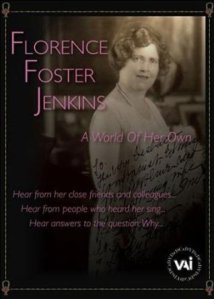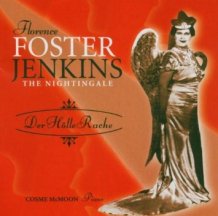 July
19
July
19
Tags
Florence Foster Jenkins: The World’s Worst Singer?
 On the 19th of July 1868, American amateur operatic soprano Florence Foster Jenkins was born in Wilkes-Barre, Pennsylvania. Jenkins had no sense of rhythm or intonation, yet she became highly popular during her time, making it eventually into Carnegie Hall, New York. Considering her lacking vocal abilities, she nevertheless appears to have taken herself seriously and her notoriety may have equally been the result of public conspiracy and bluff. Her voice technically vanished into thin air in the upper register, making listening to her singing both comical and unpleasant. Surprisingly, a staple in her performances was The Queen of the Night’s aria in Mozart’s The Magic Flute – never in living memory had a singer so untalented tried to climb to such ambitious heights and with such embarrassing results! And yet Florence Foster Jenkins had made it into a true star.
On the 19th of July 1868, American amateur operatic soprano Florence Foster Jenkins was born in Wilkes-Barre, Pennsylvania. Jenkins had no sense of rhythm or intonation, yet she became highly popular during her time, making it eventually into Carnegie Hall, New York. Considering her lacking vocal abilities, she nevertheless appears to have taken herself seriously and her notoriety may have equally been the result of public conspiracy and bluff. Her voice technically vanished into thin air in the upper register, making listening to her singing both comical and unpleasant. Surprisingly, a staple in her performances was The Queen of the Night’s aria in Mozart’s The Magic Flute – never in living memory had a singer so untalented tried to climb to such ambitious heights and with such embarrassing results! And yet Florence Foster Jenkins had made it into a true star.
She was the daughter of a banker, but already in her youth she expressed her desire to become a professional musician. Her father, however, set in his Victorian ways, did not approve of his daughter’s wish and hoped that she would lead a domestic life instead. As a result, she got married to a doctor, Frank Thornton. But the marriage did not last very long, and its dissolution meant that she could barely support herself from the piano lessons she was giving. It was only after her father’s death, and with the money that was left to her, that she was able to follow her inner calling.
 She immediately took up voice lessons, which in all honesty had very little impact on her singing technique. Her dubious sense of rhythm forced her accompanist, Cosme McMoon, to make adjustments to her tempo variations and mistakes. It did not discourage her at all, but rather fuelled her hopes of a future career as an operatic singer. Consequently, she financed small solo recitals and attracted a society of women around herself in order to support her musical endeavours. At the same time she became an active supporter of the musical arts, creating a small fund to help young musicians. An expert organizer, she put together benefits and recitals and included herself in the line-up of performers. An additional way of creating a direct connection with the audience was through the personal sale of tickets to her recitals. Ever proactive, at the end of each concert, she asked her public to write to her and tell her what songs they liked the most. It seems that her interpersonal and managerial skills outweighed her musical talent by far. But it is probably thanks to the former that she was able to fulfil her dream.
She immediately took up voice lessons, which in all honesty had very little impact on her singing technique. Her dubious sense of rhythm forced her accompanist, Cosme McMoon, to make adjustments to her tempo variations and mistakes. It did not discourage her at all, but rather fuelled her hopes of a future career as an operatic singer. Consequently, she financed small solo recitals and attracted a society of women around herself in order to support her musical endeavours. At the same time she became an active supporter of the musical arts, creating a small fund to help young musicians. An expert organizer, she put together benefits and recitals and included herself in the line-up of performers. An additional way of creating a direct connection with the audience was through the personal sale of tickets to her recitals. Ever proactive, at the end of each concert, she asked her public to write to her and tell her what songs they liked the most. It seems that her interpersonal and managerial skills outweighed her musical talent by far. But it is probably thanks to the former that she was able to fulfil her dream.
The public, hungry for laughter and entertainment, attended Jenkins’ performances in great numbers. During these, she proudly attested to the ‘un-glory’ of the human voice and the glory of human spirit. Her on-stage persona was as distinguished as her repertoire. She wore glamorous costumes, her favourite being the “Angel of Inspiration”, a costume which featured a pair of giant white wings. On some occasions, she would carry a basket full of carnations, which she would throw to the audience.
“Madame Jenkins was a remarkable example of a person who pursued her desire for self-expression to its ultimate consequence. The extravagance of her vision may have been a laughing matter, but it was that of someone who had refused to be inhibited by critics. She was the heroine of the untalented, those who were destined to live forever in the darkness of history because of their unremarkableness. She was a performance artist, a sum larger than its parts, a determined spirit intent of proving that the love of art could be just as powerful, if not more powerful, than the perfect execution of it. Her accompanist, McMoon, said, “When it came to singing, she forgot everything. Nothing could stop her. She thought that she was a great artist.”” (Pablo Helguera, Theatrum Anatomicum (and Other Performance Lectures))
Following a car accident in 1944, Florence discovered that she was finally able to reach “a higher F than ever before”. And that was her ticket to Carnegie Hall where, aged 76, the singer reached the highest point in her singing career. Unfortunately, she died one month later. “At her last concert, at Carnegie Hall, her artistry was not entirely lost on the critics. While reviews of the recital included the usual derisive comments, many of them had mild and polite asides. One reviewer wrote, “Everybody had a pleasant evening.” Wrote another, “Her attitude was at all times that of a singer who performed her task to the best of her ability.” Robert Bager of the New York World-Telegram observed, “She was exceedingly happy in her work. It is a pity so few artists are. And her happiness was communicated as if by magic to her listeners…who were stimulated to the point of audible cheering, even joyous laughter and ecstasy by the inimitable singing.”” (Helguera).
Jenkins’ conclusive motto was, “People may say I can’t sing, but no one can ever say I didn’t sing”. We can only agree to that and conclude by saying: nothing is impossible to a willing mind!










Reblogged this on Rogues & Vagabonds.
LikeLike
Reblogged this on knitcident and commented:
Comedienne w/ a niche & ahead of her time? Pre-YT. Love her brochure, too.
LikeLike
I think I may have acquired a new obsession.
LikeLike
She is quite addictive… It’s a fact 😉
LikeLike
Fantastic post!!! Thank you.
LikeLike
Thanks a lot!
LikeLike
I found this to be both amusing and strangely inspiring…
LikeLike
Thanks 🙂
LikeLike
no… thank you…
LikeLike
Well done her! And what a relief to find that I am not the world’s worst singer. I agree with a previous remark about this being strangely inspiring
LikeLike
Reminds me a bit of Scottish poet William MacGonagal who persisted to comic effect despite or maybe because of poor notices from the critics. Bad sincere art is always quite interesting I think!
LikeLike
Reblogged this on Herds of Gnus and Wildebeest… and commented:
Bad sincere art is always interesting isn’t it? Brings to mind MacGonagal and that woman from Northern Ireland …
LikeLike
good for her, i like her spirit!
LikeLike
I love her story and enjoyed the movie
LikeLike
Oh, my… LOL… listened from beginning to end.
LikeLike
I saw a film about her and loved her zest for life
LikeLike